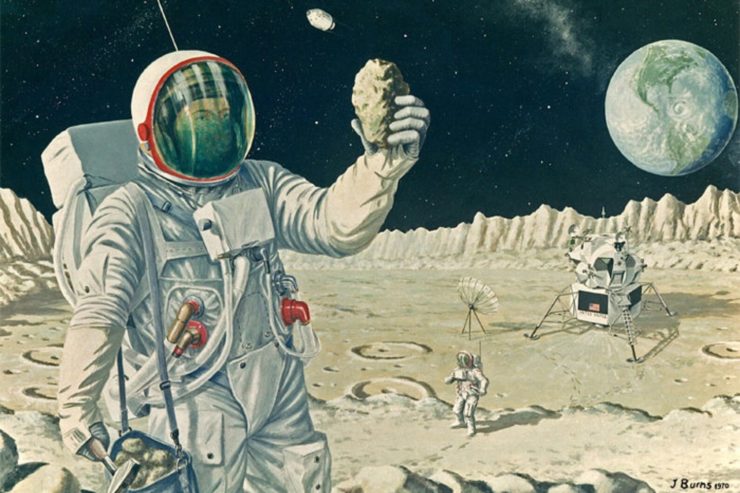Canadians recently woke to discover that a golden age of deep space mayhem had come to an end, thanks to a clause in the 2022 federal budget. Canadian jurisdiction now extends to the stars. Thus, Canadian astronauts are no longer free to slaughter other nation’s space travellers before looting their still-warm bodies. Years of smuggling cutlasses into space have all been for naught.
Presumably some sort of jet-pack-wearing analog of the Royal Canadian Mounted Police will be along to enforce this. Its officers might well wonder “how would a space-based police force work? How does one even set fire to a barn in space?” Happily, while a space patrol may be new to Canada, SF authors have already explored how such an organization might operate, as these five vintage works prove.
Space Cadet by Robert Heinlein (1948)
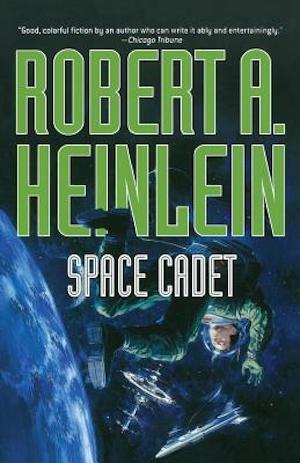
While hardly the first space patrol novel, Heinlein’s coming-of-age tale may be one of the best known. Space Cadet follows the education and early career of would-be Interplanetary Patrolman Matt Dodson, from his enrollment to his first major assignment on Venus. Along the way, he is transformed from a naïve teen into a responsible young man.
While the Patrol reserves the option to simply nuke problems from orbit, it prefers more subtle approaches. The Venus affair is a case in point. In the 19th or 20th century, a dispute between natives and traders might have been resolved through violent retribution against the natives. The Patrol, with its more ethical and enlightened outlook, does its best to respect the Venusians and deliver actual justice. Hard news for the trader in question, who is very much in the wrong.…
Galactic Patrol by E. E. Smith (1937 for the magazine serial, 1950 for the novel)
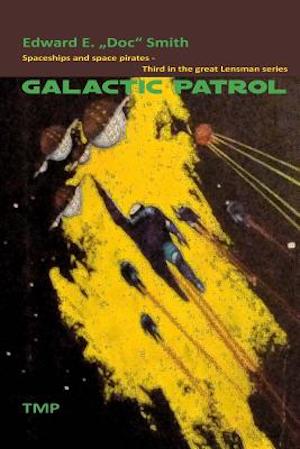
The Galactic Patrol draws its candidates from all the races in galactic civilization, many of whom seem strange indeed, from a human perspective. Reconciling a bewildering diversity of cultures into one functional whole is a stupendous challenge. Good thing for civilization that not only is it being mentored (largely secretly) by the nigh-godlike Arisians, but civilization’s principal enemy is a collection of cosmic horrors against whom even Palainians seem down right neighborly.
Although he has no idea that he is the product of a secret Arisian breeding program carried out over millennia, Kimball Kinnison does know he earned his place as Patrol Lensman thanks to hard work and innate talent. He could be excused for believing himself up to any task set for him by the Patrol. His encounter with the Wheelmen, more than a match for a naïve Lensman, will prove a rude awakening.
Star Rangers by Andre Norton (1953)
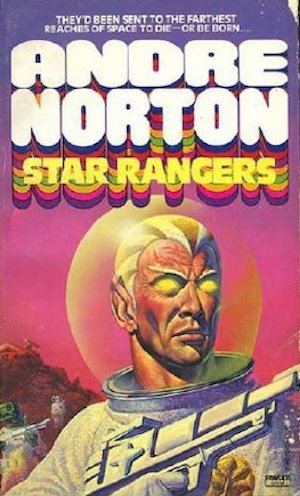
Which races are dominant and which are subjugated have shifted and changed over the millennia—but regardless of who was in command, Central Control’s institutions have prevailed. Even star-spanning civilizations are mortal, if not as mortal as their subjects. In the year 8054, night is swiftly falling across the once-vibrant First Galactic Empire. How long the ensuing dark age will be, none can say.
The Stellar Patrol maintains Central Control’s law. The last remnant of the Patrol is by virtue of mere existence a threat to any would-be local warlord. The Stellar Patrol Scoutship Starfire is one such remnant, crewed by stalwart Patrolmen whose reward for loyalty will be a mission from which none of them are intended to return.
Star Cops, created by Chris Boucher (1987)
By 2027, near-Earth space has been thoroughly industrialized by the nations of Earth. Conflict is inevitable. All space-faring nations agree that there must be some agency charged with maintaining the peace. Thus, International Space Police Force is created, with the mandate of maintaining law and order…IN SPAAACE.
Nathan Spring has to be strong-armed into accepting the post as commander of the International Space Police Force. Spring is aware of the ISPF’s central contradiction: each nation wishes its rivals to be subject to the law, while none wish to be subjected to it. The so-called “star cops” are a collection of dubiously competent, questionably honest, eminently expendable no-hopers. It’s Spring’s job to somehow transform them into an effective police force.
Breaking Strain by Paul Preuss (1987)
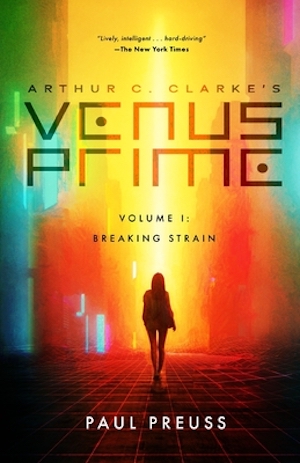
Sparta has little idea whose prisoner she was before she escaped. Lest her enemies capture again, she hides. She has reinvented herself as “Ellen Troy.” Ellen Troy is a Space Board investigator. It’s a job that may or may not grant her access to information that will lead her to her former captors, but it will definitely land her in the midst of some intriguing cases.
Take the matter of the interplanetary freighter Star Queen. Stricken mid-voyage, the craft lacks enough air to sustain crewmen Grant and McNeil for the three weeks it will take to reach Venus. There is more than enough air to keep one of them alive. McNeil survives. Grant vanishes. Troy must determine how Grant came to exit Star Queen, and if the mishap that afflicted the craft was bad luck or deliberate sabotage.
***
No doubt many of you have your own favourites (although you might check here to make sure I did not mention them in a previous article). Comments are, as ever, below.
In the words of fanfiction author Musty181, prolific book reviewer and perennial Darwin Award nominee James Davis Nicoll “looks like a default mii with glasses.” His work has appeared in Publishers Weekly and Romantic Times as well as on his own websites, James Nicoll Reviews (where he is assisted by editor Karen Lofstrom and web person Adrienne L. Travis) and the 2021 and 2022 Aurora Award finalist Young People Read Old SFF (where he is assisted by web person Adrienne L. Travis). He is a four-time finalist for the Best Fan Writer Hugo Award, and is surprisingly flammable.










